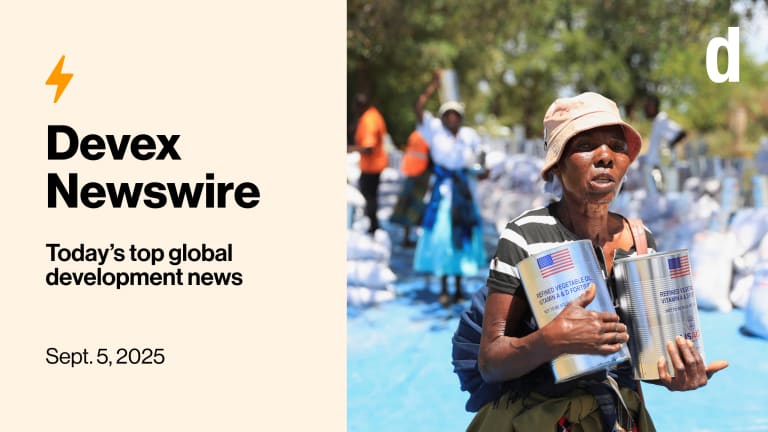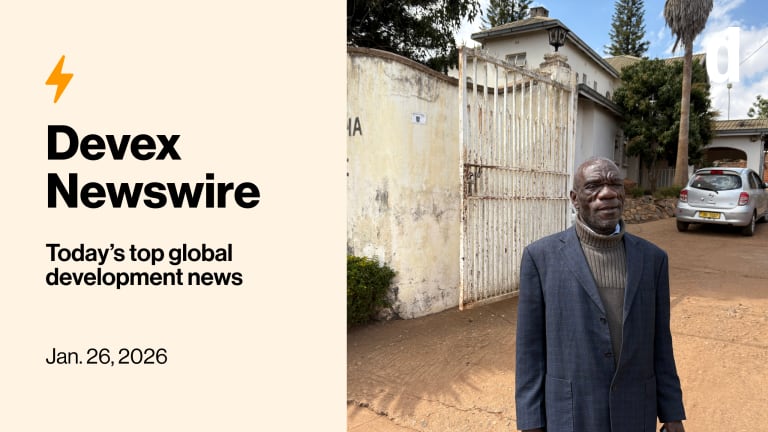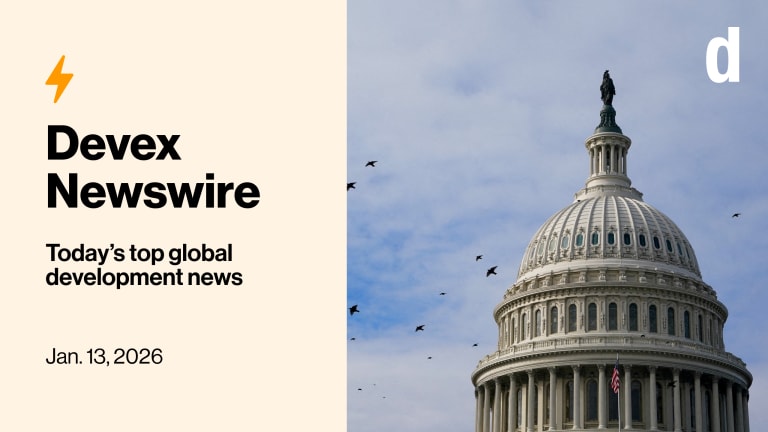
As the Russian invasion in Ukraine intensifies causing lasting damage, the development community has warned that the effects of the war will be felt by the world’s poorest.
+ Devex President and Editor-in-Chief Raj Kumar will be moderating Power dynamics and global health: Can the south lead for a change? — an event hosted by the Harvard Chan School of Public Health. It’s happening on March 9 at 11 a.m. ET (5 p.m. CET).
At the opening of the World Bank Group’s Fragility Forum on Monday, Mauritania warned that government budgets for development would likely have to be diverted, with food and fuel prices skyrocketing.
This is a preview of Newswire
Sign up to this newsletter for an inside look at the biggest stories in global development, in your inbox daily.
“There is a need to subsidize a lot of products, but subsidize with what resources? This is a big issue. Many projects may be deferred,” said Ousmane Mamoudou Kane, the minister of economic affairs.
World Bank President David Malpass warned of “serious negative consequences for developing countries,” noting that the broad price inflation would hit the world’s poor most acutely.
Coming on the back of COVID-19, inflation, and interest rates hikes, the outlook is worrying. Already, global development is regressing, Malpass noted, with rising rates of poverty and sharp declines in education, nutrition, and economic growth indicators.
Aid budgets could also be overwhelmed, panelists warned, urging high-income nations not to divert funds from existing programs, but to set aside a new pot of money for Ukraine and its neighbors hosting refugees.
Perhaps encapsulating the current state of the world, Peter Maurer, the president of the International Committee of the Red Cross, lamented that “weapons get cheaper by the day, food gets more expensive by the day.”
+ Catch up on all our coverage of the humanitarian response to the war in Ukraine.
Bank on this
On Monday, the World Bank board approved an assistance package for Ukraine worth a total of $723 million. The package is broken into parts, with the budget support section made up of a supplemental loan for $350 million and guarantees of $139 million. In addition, grant financing came in at $134 million and parallel financing at $100 million.
Malpass insisted the bank would stand with Ukraine in the face of the “violence and extreme disruption caused by the Russian invasion.” The bank is also aiming to mobilize $3 billion for Ukraine and additional support for neighboring countries.
+ The latest edition of Devex Invested tackles the European Union’s plan to get the private sector more involved in humanitarian aid. Sign up now and get it in your inbox today.
Support group
The announcement from the bank came after British Prime Minister Boris Johnson launched a new International Ukraine Support Group, together with the governments of Canada and the Netherlands.
The premier pledged the group would “coordinate the efforts of the international community.” My colleague Will Worley has the details, including why the latest U.K. aid pledges for Ukraine could signal a renewed willingness in London to give budget support to foreign governments.
Aiding Ukraine: UK, Canada, Netherlands announce 'international Ukraine support group'
Staggering numbers
This morning, Russia’s ambassador to the United Nations, Vassily Nebenzia, announced plans for another cease-fire, with Moscow agreeing to open humanitarian corridors to let civilians evacuate to a country of their choice. The announcement comes after Ukraine rejected Russia’s proposal to allow civilians to evacuate to Russia or Belarus.
The needs the donors will have to meet outside Ukraine are huge. In less than two weeks, more than 2 million people have fled the country, according to UNHCR. More than half have fled to Poland, where local authorities and aid workers are scrambling to help.
I spoke with Becky Bakr Abdulla of the Norwegian Refugee Council, who was at the Medyka border crossing. She praised the “huge mobilization of the Polish people,” noting that locals are really stepping up with assistance. International organizations should offer help, especially on funding and technical assistance, she said.
Russian Foreign Minister Sergey Lavrov and his Ukrainian counterpart Dmytro Kuleba will meet in Turkey on Thursday, the foreign ministry in Ankara said, the first such high-level meeting since the conflict began.
Joyeux March 8
We’d be remiss not to wish everyone a Happy International Women’s Day. To mark the occasion, Devex Career Editor Justin Sablich put together a snapshot of the hiring landscape for gender and social inclusion roles, including who is hiring, what experience is in demand, and where the jobs are.
Hiring trends: Gender and social inclusion roles in global development (Career)
For Devex Pro subscribers, my colleague Miguel Antonio Tamonan has a deep dive on the Gates Foundation’s funding for women’s empowerment.
Funding female empowerment: How the Gates Foundation spent $765.4 million on gender initiatives
Catch up: We’ve been covering #AidToo and gender equality, including the gender pay discrimination in USAID.
+ Not gone Pro yet? Start your 15-day free trial now for deeper analysis of the development sector, exclusive digital events, and access to the world’s largest global development job board.
One step forward, two steps back
But as we reported last week, economic equality is still a ways away. Catherine Cheney has some more bad news from the technology sphere: Women are now 16% less likely than men to use mobile internet, up from 15% last year. This figure has been steadily declining since 2017. Catherine reports that mobile phone operators can be key to helping get the world back on track.
New data: Gender mobile gap increased during pandemic
In the U.K., Liberal Democrat member of Parliament Layla Moran is presenting a bill in the House of Commons today, which, if passed, would force the government to present an impact assessment of the effects of the U.K. aid cuts on women and girls.
Moderna Africa
Moderna is setting up shop in Kenya. The company announced plans to set up its first Africa-based manufacturing facility which is expected to produce up to 500 million vaccine doses annually, Sara Jerving reports.
The company also announced that it has expanded its commitment to not enforce COVID-19 patents during the pandemic to more broadly never enforcing COVID-19 patents in the Gavi COVAX Advanced Market Commitment for 92 low- and middle-income countries.
Despite the moves, the company has received criticism for not taking part in the World Health Organization’s COVID-19 messenger RNA technology transfer hub in South Africa.
Vaccine manufacturing: Moderna's first African mRNA vaccine facility will be in Kenya
The road ahead: There's a lot of interest in building Africa's vaccine manufacturing sector. But how can it be sustained?
+ Get exclusive global health news and insider insights by signing up to Devex CheckUp — our free, must-read Thursday newsletter.
In other news
An analysis by anti-corruption researchers found that Russian oligarchs have donated millions to U.S. charities and institutions such as the Clinton Foundation and Amfar. [Washington Post]
Denmark has revoked residence permits for hundreds of Syrian asylum seekers but cannot deport them due to a lack of diplomatic relations with Syria. This has left dozens in limbo. [NY Times]
Scientists identify 16 genes that predispose patients to severe COVID-19 symptoms, as part of the world’s largest study into the genetics of the disease. [Financial Times]
Sign up to Newswire for an inside look at the biggest stories in global development.








